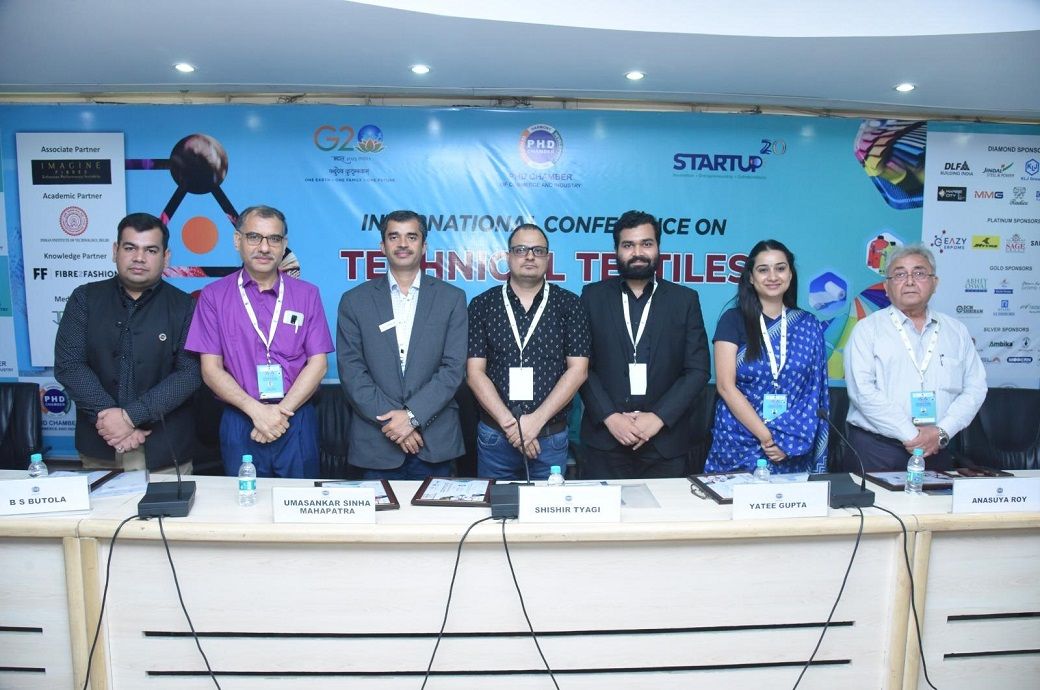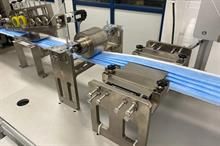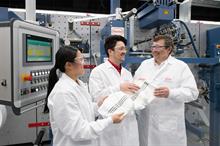
PHD Chamber of Commerce and Industry (PHDCCI) had organised the one-day conference in New Delhi, in which industry leaders and participants brainstormed on the topic. The theme of inaugural session was ‘Market Growth, Opportunities, and Challenges in Technical Textiles’. Addressing the conference, Saxena said that export penetration level in India is just 10-12 per cent in total technical textiles market. On the other hand, the penetration level is up to 70 per cent in other countries. It shows that India has potential to grow in the export market. Domestic demand of technical textiles is also growing fast because of developmental activities. However, absence of high-performance capacity is weak point of Indian industry. Research and development, machine manufacturing and skilled manpower are also challenges which need immediate attention. He also focused on quality of products in the segment as there is no scope to compromise with its performance. He informed the industry that the ministry is looking to provide subsidy to engineering colleges that are willing to broaden their curriculum in textile engineering stream.
Prof. Abhijit Majumdar from Department of Textile and Fibre Engineering, IIT Delhi, said in his theme address that technical textile is a fast-growing segment. It needs skilled manpower. “IIT Delhi is working with industry to provide technical textile professional. Industry should provide good working conditions to these professional to retain them.”
On the sidelines of the event, he told Fibre2Fashion, “Currently, textile industry is not offering good salary packages, so textile engineers are switching to other sectors including IT sector. He said that if the Indian industry wants to grow in the technical textiles segment, it needs to focus on high performance products.”
Nandan Kumar, Director, High Performance Textiles Pvt. Ltd., said that comfortability is big challenge in protective textiles. Protective textiles should be light weight and soft for usages. His company provides labs facility for testing of basic composition. He explained key areas for innovation in technical textiles segment.
Dr. Arindam Basu, Director General, Northern India Textile Research Association (NITRA) spoke on market trend of technical textiles. He said that the industry should focus on the segment as it can expect higher margin and excellent growth. Basu said that India is witnessing fast developmental activities, which means there is potential for higher demand for every type of technical textiles. He said that disposability is a challenge in the segment. “NITRA is working to develop fire and sound resistant technical textiles. Non-biodegradable aspect is also a problem in the segment. We need to develop biodegradable products.”
In a technical session on ‘Technical Textiles: Innovation, Possibilities, and Way Forward,’ UmaSankar Sinha Mahapatra, Managing Director, Pulcra Chemicals India Pvt. Ltd., said that protective textiles can be developed from conventional materials. The industry should focus on high performance products. Shishir Tyagi, Deputy Director of Centre of Excellence in Sporttech under Wool Research Association said that sportswear, sports goods and sports accessories are sub-categories under sports textiles. “We have to find out the gap and fulfil the same to tap the potential.”
Yatee Gupta, CEO, Fabiosys Innovations Pvt. Ltd., told the audience that his company is working on medical textiles, and has developed Fabium technology that can destroy 99.9 per cent microbes within 30 minutes.
Anasuya Roy, Founder and CEO of Nanosafe Solutions Pvt. Ltd., said that her company is working on antimicrobial medical textiles.
Dr. Ajay Kumar, Head of Chemical Department, Sharda University, told that he has developed a technology for medical textiles. Any industry can come ahead to start a venture on the technology, but it should be ready to compete multinational companies. He told Fibre2Fashion, “Scale of production is also a challenge for any company. It needs enough market to plan for a new venture.”
Prof. BS Butola, Department of Textile and Fibre Engineering, IIT Delhi, also presented his viewpoint on the issue.
Madhu Sudhan Bhageria, Chairman, PHDCCI Textiles Committee & CMD of Filatex India Ltd gave welcome address in the beginning of inaugural session, while RK Vij, Co-Chairman, PHDCCI Textile Committee and Secretary General, Polyester Textile Apparel Industry Association, presented vote of thanks.
Fibre2Fashion News Desk (KUL)

